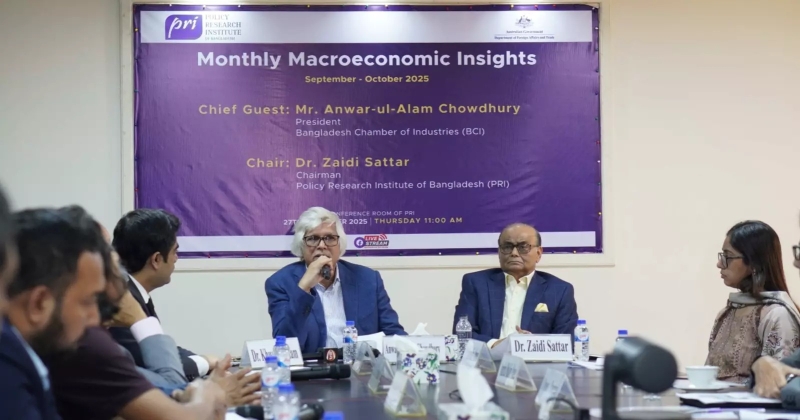- 2 killed as bus hits truck on Dhaka-Chattogram highway |
- Chief Adviser seeks prayers for Khaleda Zia’s recovery |
- Southeast Asia Floods Kill Over 250, Thousands Displaced |
- Trump Vows to Halt Migration From ‘Third World’ Nations |
- Journos should strengthen themselves to secure rights: Fakhrul |
Policy changes, poor business environ fuel NPL crisis: BCI

Monthly macroeconomic insights September-Octoner 2025._11zon
The President of the Bangladesh Chamber of Industries (BCI), Anwar-ul-Alam Chowdhury Parvez, on Thursday strongly contested the narrative that primarily blames business owners for the staggering rise in Non-Performing Loans (NPLs), arguing that the entire responsibility should not be placed on them.
Speaking at the Policy Research Institute (PRI)’s 'Monthly Macroeconomic Insights' seminar, Parvez stated, "The business environment is currently not entrepreneur-friendly. To pay off previous debts, entrepreneurs are being forced to take out new loans, which further increases the risk of default."
He specifically pointed to a recent policy change in loan classification as a major factor contributing to the NPL spike.
"Previously, the classification period for a loan was six months. Now, it has been reduced to three months. Consequently, any loan not repaid within three months is now immediately classified as non-performing," he said.
The BCI President’s remarks came as the keynote paper, presented by PRI Chief Economist Dr. Ashikur Rahman, revealed the alarming scale of the financial crisis. Dr. Rahman reported that the country’s current volume of non-performing loans stands at Tk 6.44 lakh crore, which is approximately 36 percent of the total outstanding loans.
Furthermore, he warned that the total volume of distressed assets in the banking sector could reach Tk 9.50 lakh crore, underscoring significant weaknesses in asset recovery mechanisms.
Dr. Rahman cautioned that a high NPL volume could lead to a future "credit crunch" and negatively impact overall investment.
To stem the rising tide of defaults, business leader Parvez urged the government to improve the country's business climate by focusing on key structural issues.
He called for-improving the law-and-order situation, resolving the persistent energy crisis, stopping the 'mob culture and ensuring consistent policy support for entrepreneurs.
He warned that "NPLs will increase further" if these fundamental issues are not solve immediately.
The seminar, which brought together business leaders and economists, was chaired by PRI Chairman Dr. Zaidi Sattar.
Dr. Zaidi Sattar, Chairman of PRI, chaired the event. In his remarks, Dr. Sattar highlighted that, “The rising REER index since May should be concerning to the exporter community as it indicates erosion of competitiveness. Bangladesh Bank can no longer purchase dollars from the market to depreciate the taka; therefore, loosening import restrictions is the only viable option. This would also benefit exporters.
More vibrant imports would support better exchange-rate management under the current flexible regime and contribute to a more dynamic export environment.”
The discussion featured insights from a distinguished panel comprising Dr. Nasiruddin Ahmed Former Chairman, National Board of Revenue (NBR), Dr. AKM Atiqur Rahman, Professor, North South University, Dr. Wasel Bin Shadat, Research Director, BUILD, and Amrita Makin Islam, DMD, Picard Bangladesh Limited, Director, LFMEAB.
Dr. Wasel mentioned, “Compliant taxpayers are being penalized, which goes against the principle of tax justice. This is one of the main reasons why 85 percent of the economy remains informal.”
Moreover, election manifestos across political parties fail to address the economic situation with sufficient seriousness, he said.
Dr. Nasiruddin Ahmed argued that tax policy should be formulated by politicians and the business community rather than bureaucrats, some of whom he believes contribute to the problem.
He also highlighted employment and the lack of quality, job-oriented education as major national concerns that the next government must address.
Atiqur Rahman noted that without the July mass uprising, the true scale of rising NPLs would have remained hidden, raising doubts about the economy’s ability to sustain itself.
He emphasized the urgent need for export diversification beyond RMG, warning that potential Trump-era tariffs and a Real Effective Exchange Rate (REER) above 6 percent are already weakening competitiveness. - UNB

